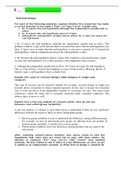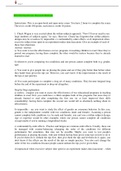PSY550 Research Methods (PSY550)
Grand Canyon University
All 3 results
Sort by

-
PSY550-Research Methods Final Exam 2022 With Answers Graded A+.
- Exam (elaborations) • 6 pages • 2022
-
- $4.49
- + learn more
PSY550-Research Methods Final Exam 2022 With Answers Graded A+. 1. QUESTION: For each of the following examples, explain whether the researcher has made a correct decision or has made a Type 1 or Type 2 error. Explain why. 2. Dr. G rejects the null hypothesis although the independent variable had no effect. 3. Dr. R rejects the null hypothesis when it is false. 4. Although the independent variable had an effect, Dr. E does not reject the null hypothesis Your Answer: 1. Type I error is m...

-
Exam |Elaborated| PSY550-Research Methods - Final Exam Answers-Graded A+
- Exam (elaborations) • 4 pages • 2021
-
- $12.99
- + learn more
Exam |Elaborated| PSY550-Research Methods - Final Exam Answers-Graded A+ For each of the following examples, explain whether the researcher has made a correct decision or has made a Type 1 or Type 2 error. Explain why.Explain the value of reversal designs (ABA designs) in single-case researchExplain how a one-way analysis of variance works. How do you use between- and within-group variability?After watching nursery-school children, Ken Garoo wants to test the hypothesis that some toys are mo...

-
Exam (elaborations) PSY550-Research Methods Final Exam Answers(V1)
- Exam (elaborations) • 5 pages • 2021
-
- $12.49
- + learn more
Exam (elaborations) PSY550-Research Methods Final Exam Answers(V1) PSY550 Final Exam: Research Methods 1. Chuck Wagon is very excited about the within-subjects approach. “Now I’ll never need to run large numbers of subjects again,” he says. However, Chuck has forgotten that within-subjects designs may be a) useless, b) impossible, c) confounded by order effects, or d) impractical when excessive subject time spent in an experiment makes data inaccurate. Give an example of each of these ...

Study stress? For sellers on Stuvia, these are actually golden times. KA-CHING! Earn from your study resources too and start uploading now. Discover all about earning on Stuvia


